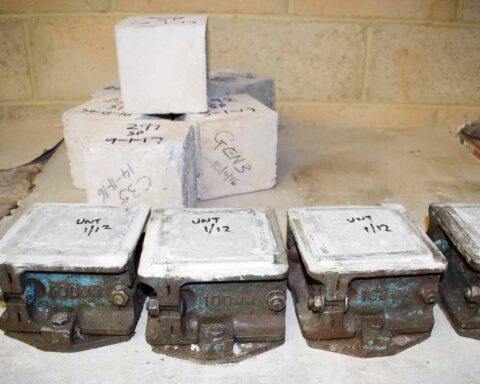 Our in-house laboratories are equipped to provide an extensive range of concrete testing services which meet the appropriate British and European Standards.
Our in-house laboratories are equipped to provide an extensive range of concrete testing services which meet the appropriate British and European Standards.
Typical testing includes compressive strength of concrete cubes and cores.
We provide an on-site service to facilitate the sampling and making of concrete test cubes as well as a collection service. All cubes are appropriately cured in readiness for testing at our laboratory.
We provide an on-site service to facilitate the sampling and making of concrete test cubes in clean, oiled steel moulds as well as a collection service. All cubes are appropriately cured , on receipt, in readiness for testing at our laboratory.
Our laboratory also provides chemical testing to assess the risk of attack on buried concrete from aggressive ground conditions arising from sulphates and/or acidic soil as outlined in the BRE SD1 guidance document. Additional technical advice and assistance is also available from our team of professional geotechnical and civil engineers.
| Concrete Cube Compressive Strength | BS EN 12390-3 | Determines the strength of hardened 100 – 150mm concrete cubes usually at 7, 14 and 28 days after casting in cleaned, oiled steel moulds. Used as quality control during construction of concrete structures |
| Concrete Core Compressive Strength | BS EN 12504-1, 12390-3 & 12390-7 | Used to assess the strength of concrete in existing structures. |
| Depth of Carbonation (by Phenolpthalein indicator) | BS EN 14630 | This test is used to establish whether the pH of concrete has reduced. A lower pH can allow corrosion of reinforcement. |
| Sulphate Content | BS1881-124 | Used to assess whether concrete in a structure is likely to have been attacked by sulphates. |
| Chloride Content | BS1881-124 | Used to assess whether concrete in a structure is likely to have been attacked by chlorides. |

The above tables do not list all available tests.
Please contact us to discuss your site investigation testing requirements.

